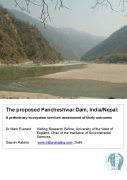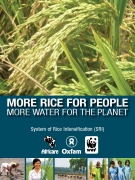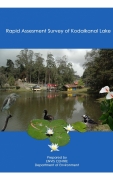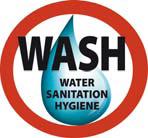/topics/ecology-and-environment
Ecology and Environment
UN affirms the right to safe and clean drinking water
Posted on 02 Aug, 2010 02:56 PMA remarkable piece of water history should have been headline news everywhere this week.
India WASH forum e-newsletter - Update 13 July 2010
Posted on 02 Aug, 2010 11:56 AMWe see this newsletter as a platform for independent credible voice in the water and sanitation sector. Our emphasis is on bringing together critical news and information with analysis. In this issue we share news and analysis on topical issues and developments.
The Department of Drinking Water and Sanitation(DDWS) has simultaneously invited inputs to Discussion Papers on Drinking Water and Sanitation, circulated on Solution Exchange. Inputs given by India WASH Forum, on this, is enclosed in this Update. We have pointed out the missing elements of sanitation improvement strategy that include, criticality of providing water as an inseparable component to household sanitation, the tendency to see behavior change as a lifestyle issue and not linked to the hardware components, peoples livelihoods and living conditions. Suggestions for what needs to be done to strengthen the implementation mechanism of the flagship sanitation programme(TSC) and partnerships.
A preliminary ecosystem services assessment of likely outcomes of the proposed Pancheshwar dam in India/Nepal - An IES report (2010)
Posted on 02 Aug, 2010 02:24 AM This report by the IES presents the findings of a study that explores the likely impacts of the recent proposals in India to build a dam at Pancheshwar in the Himalayas on the river ecosystems and the surrounding areas and people involved. This dam will be the world's second tallest structure intended to harness hydroelectric power and water by controlling the flow of the Kali river and its tributaries.
This report by the IES presents the findings of a study that explores the likely impacts of the recent proposals in India to build a dam at Pancheshwar in the Himalayas on the river ecosystems and the surrounding areas and people involved. This dam will be the world's second tallest structure intended to harness hydroelectric power and water by controlling the flow of the Kali river and its tributaries.
The document argues that although there are many benefits of the dam in terms of energy and water, the wider ramifications of the dam and its consequences for the people staying around the area have not been thought about in the planning process. The planning process has not engaged local people in the decision-making process, there is paucity of published information and the environmental and social consequences have been considered belatedly in the planning process.
More rice for people - More water for the planet - A WWF-ICRISAT report about System of Rice Intensification
Posted on 02 Aug, 2010 02:08 AM This project report by WWF-ICRISAT begins by highlighting the importance of rice as a major source of calories for half the world’s population and also as the single largest source of employment and income for the rural population.
This project report by WWF-ICRISAT begins by highlighting the importance of rice as a major source of calories for half the world’s population and also as the single largest source of employment and income for the rural population.
It makes connections between rice production and its impact on the environment and argues for need to adopt techniques such as System of Rice Intensification (SRI) to improve produce and reduce the damage to the environment.
For example, current practices at genetic uniformity can make crops more vulnerable to pests and diseases. They are also wasteful of increasingly scarce and costly resources such as water and fossil fuels. Heavily fertilised, continuously flooded rice fields produce greenhouse gases that contribute to global warming, and misuse of inorganic fertilisers and agrochemicals results in soil and water pollution. Evidence indicates that there has been a gradual slowdown in the yield gains of rice in many countries.
Rapid assessment survey of Kodaikanal lake - ENVIS Centre (TN) (2009)
Posted on 02 Aug, 2010 02:02 AM This document by the Department of Environment, Government of Tamil Nadu highlights the importance of the Kodaikanal lake as an important tourist destination and warns that this freshwater lake is under the threat of getting polluted and its biodiversity endangered.
This document by the Department of Environment, Government of Tamil Nadu highlights the importance of the Kodaikanal lake as an important tourist destination and warns that this freshwater lake is under the threat of getting polluted and its biodiversity endangered.
The document presents the findings of the study that aimed at assessing the physico-chemical and biological quality of the Kodaikanal lake.
Evidence indicates that unrestricted tourism activities have led to high use of plastic bottles, glass bottles, plastic bags, causing high levels of pollution and silting of the lake. Damaged fibreglass boats left inside the lakes also pose a serious threat to the lake ecosystem.
Salvaging and scapegoating: Slum evictions on Chennai’s waterways - EPW paper
Posted on 02 Aug, 2010 01:03 AMThe paper highlights the case of recent projects that have been planned on the river Cooum in Chennai.
Environmental flows: Free-flowing rivers around the world
Posted on 30 Jul, 2010 11:56 AMThis is the first in a new series of articles that IWP will host on various aspects of Environmental Flows. We welcome your comments and original articles for this series, please mail us at portal@arghyam.org
The other side of the story: Free-flowing rivers around the world
With around 5100 large dams, India ranks third in the world with regards to the number of large dams. The ongoing debate over the economic, social and environmental costs of large dams has indicated many times that these costs are not commensurate with their benefits. Although we have dammed all our major rivers, (except Brahmaputra and plans to dam its major tributaries are on way, some like Ranganadi have already been dammed), profoundly changing their hydrological, ecological, social and cultural systems, we are yet to form a policy which states that environmental flows in rivers are a necessity. It is more than clear now that environmental flows relate to well being of not only ‘birds and fishes’, but also of the entire human society . Take an example of fisheries, lack of flows in rivers and contractor-owned reservoir fishing has affected the livelihood of hundreds of thousands of small fishermen . Environmental flows also dilute pollution load, so let us not hide behind the fact that pollution is wiping out our riverine fish, not the absence of flows. It is also clear that environmental flows do NOT mean a decommissioning of all the present dams, nor do they mean any random figure like 60% or 10% of MAR . Eflows require reaching a wise compromise through science and local negotiations, for each river.
While many countries have put in place policies and laws for maintaining environmental flows in their rivers, there is also a rarer category: Rivers which have not been dammed yet, rivers which retain their connection from the source to the sea, nurturing myriad ecosystems and communities in their wake! These are known by many names like Free flowing rivers, Wild Rivers, Pristine/ Virgin rivers, Heritage Rivers, etc., each indicating their rare character and value. In ecological and cultural terms, the value of these rivers is immense and as more and more rivers are being dammed the world over, this value is increasing steeply. Unfortunately, in today’s economic terms, these rivers are still waiting to get their due recognition, but as human systems evolve, they will surely be seen as ‘invaluable’ service providers with phenomenal use and non use values.
Dr. G. D. Agrawal , the scientist, environmentalist and rishi
Posted on 27 Jul, 2010 03:52 PMDr. G. D. Agrawal Scientist and Rishi
Meeting Dr. G. D. Agrawal in his spartan, two room cottage in Chitrakoot, Madhya Pradesh, you would never guess what an accomplished and distinguished scientist he is – first Member-Secretary of the Government of India’s Central Pollution Control Board, former Head of the Department of Civil and Environmental Engineering at IIT Kanpur and a PhD from the University of California, Berkeley. The list goes on and on.
Yet this eminent professional sweeps his own floors, washes his own clothes and cooks his own meals. He retains only a few possessions and dresses in homespun khadi. At the age of 76, his main mode of transport within Chitrakoot is a bicycle and when he travels further afield, he goes by ordinary bus and second-class train. These are the deliberate choices of a devout Hindu whose deepest values are for simplicity and reverence for nature. Dr G.D. Agrawal is the doyen of environmental engineering professionals in India. Well past retirement, he continues to teach and inspire students as an Honorary Professor of Environmental Sciences at the Mahatma Gandhi Chitrakoot Gramodaya Vishwavidyalaya, in Chitrakoot (M.P.).
Protecting Pili river from land and pond encroachment
Posted on 27 Jul, 2010 02:50 AMdear all, I have sent several mail to concern department including minster jairam romesh regarding the Protecting PILI river , due to filling pond , taal , river land , dam to a river land encroachment in my village KOPA , Unfortunately, I still haven't received my reply .
A sudy of the core of a riverine system and relevance of meltwater in river basin hydrology
Posted on 25 Jul, 2010 10:44 PMMy house is about 20 years old and is located in R T Nagar in Bangalore. In 1990, I had got a borewell dug. The Borewell is about 150 feet deep and has been giving me excellent quality water until about 2 years ago when I started noticing muddy water. The water that is pumped to an overhead tank contains fine particles of mud which tends to settle down in the overhead tank.






